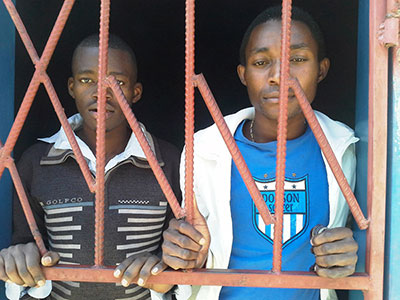SHACKLED BY HOMOPHOBIC LAWS

More than five months without bail: James Mwape and Philip Mubiana (Pic: Erasing 76 Crimes)
October 24 marked the celebration of 49 years of Zambia’s independence. Despite close to half a century of independence from Britain, Zambia still holds fast to, and claims as its own, some draconian laws inherited from its colonial masters.
One such law is the criminalisation of sodomy, still entrenched in the Zambian Penal Code.
Currently, the act of consensual sodomy is criminalised and carries with it a minimum sentence of 15 years to life. Lesbian, gay, bisexual, transgender and intersex persons (LGBTI) are classified as social deviants.
Despite the continued vilification and persecution of LGBTI persons in Zambia, open and respectful public debate on the matter is discouraged. Human rights defenders who dare to speak out on the issue are routinely harassed and persecuted for “promoting homosexuality” or for “inciting” the public to take part in “immoral activities”. This occurs despite the Zambian Constitution’s guarantee of freedom of expression, as enshrined in the country’s Bill of Rights.
Zambia’s second post-independence president, Frederick Chiluba, described homosexuality as the worst kind of depravity. The current president, Michael Chilufya Sata, has failed to confront the problem of homophobia despite several of his senior cabinet ministers lending support to the hateful invectives that characterise the debate on homosexuality.
Most law enforcement officers fall prey to their own prejudices when discharging their duties, thereby contributing to a context in which vulnerable communities are susceptible to rights violations such as extortion and torture.
The devastating consequences of this on Zambia as a country cannot be overstated. Most Zambians know a LGBTI person who has suffered hate crimes, endured blackmail due to the actions of either state or non-state actors, or been driven to suicide.
These continued violations against productive members of Zambian society because of their perceived sexual orientation and gender identity continue with impunity in a country that claims to affirm the dignity of all people by its ratification of the International Covenant on Civil and Political Rights (ICCPR).
Whilst Zambia has made considerable strides since independence to reduce the gap between rich and poor, it has yet to domesticate and uphold its commitment to the fundamental human rights of its citizens and ensure the equal protection of all Zambians under law.
In fact, in recent years the state has shifted even further away from its duties by enacting laws to curtail the efforts of civil society organisations and hamper their ability to organise freely, particularly if they hold views that dissent with those of government.
The celebrations to commemorate Zambia’s Independence Day were a farce as they pander to the powerful and the privileged in society, at the expense of vulnerable and marginalised communities. This is most offensively demonstrated by October also being the fifth month since two young Zambian men were charged with two counts of allegedly contravening section 155a of the Zambian Penal Code by “having carnal knowledge against the order of nature”.
They are being denied the right to bail and a fair trial. James Mwape and Phil Mubiana of Kapiri Mposhi town in central Zambia are prisoners of the state. They remain incarcerated in Mpima maximum-security prison together with convicted felons and cannot celebrate their national independence because their fundamental liberties have been taken away by the state’s refusal to grant them bail and ensure a fair trial. This makes clear that the state is failing in its duty to ensure that all persons are guaranteed the enjoyment of their fundamental human rights as enshrined in the Zambian Constitution.
With Independence Day still fresh in our minds, it is incumbent upon every Zambian to reflect on what independence means, to call to mind the struggle of our forebears who fought for freedom, and to hold the state accountable for the protection of the rights of the marginalised. This includes the rights of LGBTI persons who are still shackled by the chains of hate, violence and fear, and who have to live with the burden of rejection by state and non-state actors, fuelled by the state’s refusal to protect them.
The duty of a state is not to entrench prejudice and bigotry driven by intolerance and fear of diversity. It must affirm the self-fulfilment and personal happiness of each citizen. The recognition of the rights of LGBTI people in Zambia and the assurance of non-discrimination against minorities are critical to a tolerant society. Ultimately it will ensure the happiness and wellbeing of all Zambia’s citizens.
For as long as LGBTI persons continue to face discrimination and suffer unlawful detention and arbitrary arrests, I have no reason to celebrate Zambia’s Independence Day.
This article originally appeared in the Cape Times and was subsequently published by the Open Society Initiative for Southern Africa.
Leave a Reply